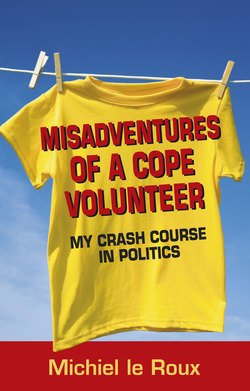Читать книгу Misadventures of a Cope Volunteer - Michiel le Roux - Страница 4
На сайте Литреса книга снята с продажи.
Foreword
ОглавлениеIt is often the case that when great events happen, the people most affected by them fail, at the time, to comprehend their full impact. Many South Africans are yet to realise how much the birth of the Congress of the People (Cope) has, in fact, affected their lives and will influence the trajectory of their future.
In spite of regular references to the failures of democracies in Africa, and especially to the latest challenges just across our border in Zimbabwe, not many people in South Africa viewed the birth of Cope as an event that was closely linked to changing the course of African politics. The course we refer to is the description of the first 50 years of independence by Martin Meredith as ‘The fate of Africa’, which has now become a generally accepted term.
Many people have described the birth of Cope in a very simplistic way as an event solely linked to the outcomes of the Polokwane Conference of the African National Congress (ANC) and very little else. In fact, even though many people who joined the party did so at great personal sacrifice, they were generally viewed as people who left the ANC in a huff after losing power in Polokwane. But historic events, of which the formation of Cope was one, can seldom be explained so simplistically.
The birth of the Congress of the People, and especially its claim to its name, as well as to the founding principles of democracy in our country – the Freedom Charter – brought about a change in the South African political landscape like no other event in recent history. The ability of Cope to lay claim to struggle credentials and as a genuine representative of the people in post-apartheid South Africa has ushered in a new era which allows ordinary citizens to reclaim patriotism. The era where a patriot could only be defined by years served in exile, the under-ground or prison, or being a member of a particular party, is now happily behind us. By calling on South Africans to rally together in support of our Constitution and constitutional democracy, Cope has ushered in a new era of patriotism open to South Africans of all persuasions.
In giving us the Congress of the People through his eyes, Michiel le Roux has begun the all important task of telling South Africans and the world what this young party is. As a young person who was intimately involved in some of the work, he can lay claim to knowing enough in order to fill in some gaps in this important story about the beginning of the end of the de facto one-party rule in one of Africa’s most promising democracies. The story of Cope will surely still be written by many and from different perspectives, but this is a very good start.
Those of us who are in Cope see its establishment and our involvement in it as a logical continuation of the struggle for democracy in South Africa. Having learnt from experience that to every generation a mission is assigned, we understood that the historic mission of today’s generation of parties is the liberation of our country and people through development. It is a different but not less important task of political liberation.
As a party rooted in the Congress tradition, Cope has the historic mission of internalising and embodying the principles of the New Partnership for Africa’s Development (NEPAD), especially that of good governance as a basic requirement for peace, security and sustainable development. But when people came to join the party, there were many who saw this not as a long-term project to help change the political landscape of South Africa and, in the long run, of Africa, but as a quick get-rich or -famous scheme. The challenges of impatience, elements of racial and other intolerance, disdain for knowledge and experience in the name of militancy, arrogance and lack of respect, undemocratic practices, personality cults, fraud, lack of accountability and abuse of power began to manifest themselves quickly and almost became a culture in the party.
The decision to combat these tendencies is what has led to the tensions in the party today, which unfortunately, once again, have been simplistically summarised as in-fighting between two leaders and their factions for positions.
What has been most gratifying, however, is that there have been enough members of the Party and South Africans who refused to succumb to the notion that ours must inherently be a corrupt party, country and continent, and have decided that our party must be in the forefront of changing this course, which we earlier recalled as ‘The fate of Africa’.
This personal account of the Congress of the People provides a much-needed window into the life of a party that could still come to govern South Africa. A party that will be a defining feature of the next 50 years of African politics within the context of an African Renaissance. A party of a new generation of South African patriots.
Lyndall Shope-Mafole*
Party leader in the Gauteng Provincial Legislature and Head of International Relations of Cope
* Lyndall Shope-Mafole served as Director General and Chief Accounting Officer of the Department of Communications from 2004 until her resignation in January 2009, when she started to work as a full-time volunteer for Cope. Among others, she also served as Councillor of the Independent Broadcasting Authority from 1994 to 1997, and as Chairperson and Head of the Presidential National Commission on the Information Society from 2002 to 2004.
